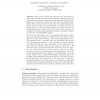Free Online Productivity Tools
i2Speak
i2Symbol
i2OCR
iTex2Img
iWeb2Print
iWeb2Shot
i2Type
iPdf2Split
iPdf2Merge
i2Bopomofo
i2Arabic
i2Style
i2Image
i2PDF
iLatex2Rtf
Sci2ools
100
click to vote
FSTTCS
2005
Springer
2005
Springer
Semiperfect-Information Games
Much recent research has focused on the applications of games with ω-regular objectives in the control and verification of reactive systems. However, many of the game-based models are ill-suited for these applications, because they assume that each player has complete information about the state of the system (they are “perfect-information” games). This is because in many situations, a controller does not see the private state of the plant. Such scenarios are naturally modeled by “partial-information” games. On the other hand, these games are intractable; for example, partial-information games with simple reachability objectives are 2EXPTIME-complete. We study the intermediate case of “semiperfect-information” games, where one player has complete knowledge of the state, while the other player has only partial knowledge. This model is appropriate in control situations where a controller must cope with plant behavior that is as adversarial as possible, i.e., the controller ...
FSTTCS 2005 | Perfect-information Concurrent Games | Semiperfect-information Turn-based Games | Turn-based Games |
| Added | 27 Jun 2010 |
| Updated | 27 Jun 2010 |
| Type | Conference |
| Year | 2005 |
| Where | FSTTCS |
| Authors | Krishnendu Chatterjee, Thomas A. Henzinger |
Comments (0)

